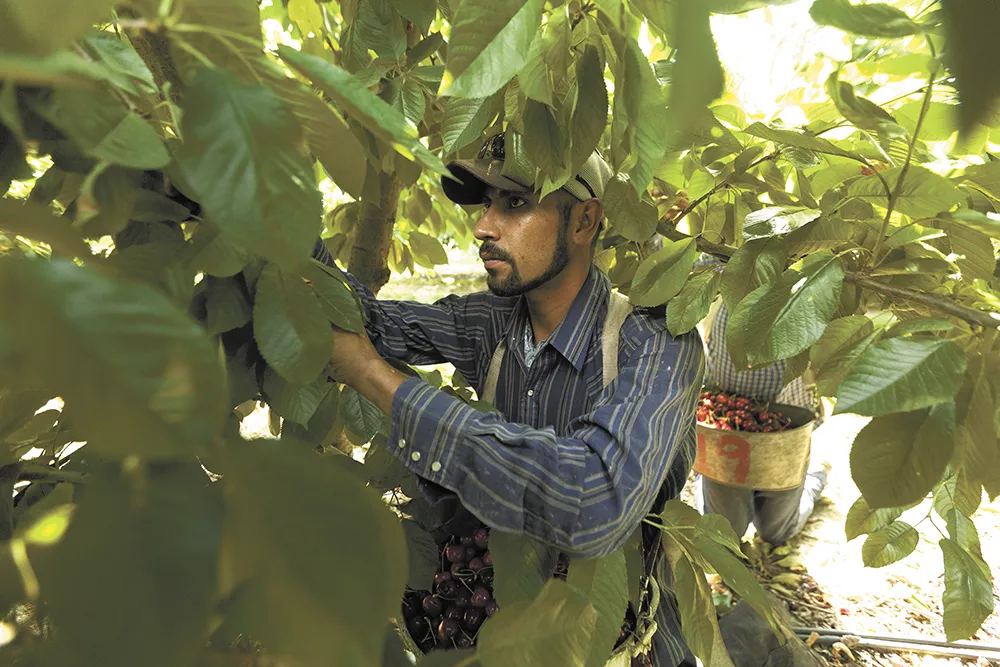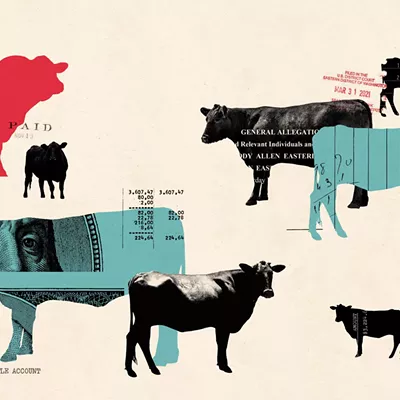Cherries ripen all at once, and the window to harvest them before they turn to a mushy mess is mere days. And this year in Washington — the nation's top cherry producer — the succulent, shiny red orbs were dangling in the June sunshine two weeks ahead of schedule. Meanwhile, the workers who were en route from Mexico to pluck them from those trees were stuck at the border due to a glitchy government computer that processes visas.
In Othello, K S Orchard manager Sarah Craver was counting on 28 guest workers to arrive the first week of June to harvest her bountiful cherry crop. Those workers were held up at the border for 10 days, and Craver was left scrambling to find workers.
"We probably lost close to a quarter of our cherries," says Craver. "We try to get the legal workforce and then we can't, and we lose crops because we don't have enough people. Cherries don't have a long life — three to seven days, depending on the heat."
Sweet cherries, as delicate as they are delicious, require skill to pick. With fewer workers than needed, that fruit-picking skill set has been commanding a premium, says Craver. One day her workforce jumped ship midday, alerted by text message to a more lucrative gig at a neighboring farm.
Cherries are big money in Washington; the 2013 crop brought in $385 million in profit, according to the Washington State Department of Agriculture. This year's 40,000-acre cherry crop was expected to send more than 19 million 20-pound boxes of cherries to market, but new estimates from the Washington State Fruit Commission project the yield at just 16 million boxes. The unusually warm weather this winter and difficulties finding workers to pick the fruit are to blame for those 3 million lost boxes.
Labor issues are nothing new to farmers. Frustrated with the dearth of local workers, Craver says K S Orchard started to use the federal H-2A guest worker program three years ago. Deciding to use H-2A isn't as simple as filling out a form; it's an expensive, time-consuming undertaking. Farms erect accommodations for the guest workers and pay for buses to chauffeur them around town.
"You put [the workers] on a plane and get them to the site at your own expense," says Keith Mathews, CEO of FirstFruits Marketing of Washington. "You house them, and it's almost like you're a policeman; you have to monitor them 24/7 and take them anywhere they need to go."
Despite the barriers to entry, many farmers have opted to supplement their workforce with H-2A workers in recent years. Mathews, who works with farms using political refugee workers, says he's been shocked to see so many farms turning to H-2A. "An employer in the U.S. has to absolutely prove there are no local workers who will take the job, and most ag employers are doing this a year ahead of time," says Mathews. Once they prove that, the employer flies to a country, usually Mexico, and puts out the word that they'll be hiring workers a year from now. Workers are hired and dates are chosen for them to arrive and depart the next summer. It's tricky business guessing when the next year's crops will ripen, and if farms miscalculate, they're left without labor when they need it.
Dan Fazio of the Washington Farm Labor Association says the local workforce is about 20 percent shy of the 75,000 workers needed to get everything grown in Washington harvested each year. "The number of H-2A workers in Washington was basically nothing until 2006," says Fazio. "This year we're expecting 12,000." Nationwide, Fazio says 1 million guest workers are needed each year, but with the difficulties processing the current 120,000 guest worker visas, he's not sure the federal government is up to the task of administering such a program.
When everything goes smoothly, H-2A is a great solution to the labor shortage, Fazio says. Farmers get a reliable, experienced and skilled workforce. Workers enter the country legally and earn over the five-month season what they would in five years at home. In Mexico, fruit pickers make about $2,500 a year. The same work up here nets about $3,000 a month.
But the program doesn't offer a lot of flexibility. In 2011, a late apple crop hung ripe from trees at the McDougall & Sons orchard on the date the Wenatchee farm's H-2A worker's visas expired. As the workers filed onto buses, then-Gov. Christine Gregoire swooped in with a solution: prisoners would pick the apples. "That was a nightmare," says Craver. "It just didn't work. The prisoners had no skills."
"There's the wrong perception in the public that anyone can do this work," says fourth-generation Clarkston farmer Eric Wilson, who relies on Washington State University students to harvest most of his fruit. "Most of the farm labor jobs we have are skilled jobs; it's not flipping burgers."
The college students don't tend to stick around more than a year or two, though, so Wilson spends a lot of time training employees. This year, Wilson's cherries were done in by weird winter weather and wasps. "We're early on everything, and when we started picking Rainiers, Lapins and Sweethearts, wasps came in, and before we could pick, they bit and dried out every one," says Wilson.
Craver says she will still use H-2A next year; it's her best option and the investment to get involved has already been made. "The domestic labor is not there, so that's the reason we went to the expensive program, and frankly, it doesn't work that well, the federal program. They can't get it together," says Craver. Fazio says the visa issues have resulted in 2,593 days of lost work so far this season.
The workers waiting south of the border are costing farmers a lot, too. Farmers not only have to pay for lodging and food for the workers stuck in limbo, they also have to pay the workers who are on their farms the elevated wage — $12.42 per hour in Craver's case — that kicks in for all workers when an H-2A contract begins.
Fazio brought 624 workers to the border on June 29 and hopes those workers will be headed up this week.
"The farmers have invested a lot in the legal worker program, they're all in, and now they're asking, 'Is the government in?'" says Fazio. "It's right for the workers, it's right for the farmers: we need the government to step up." ♦























